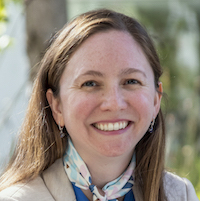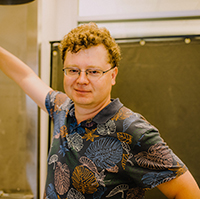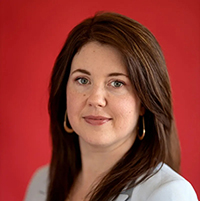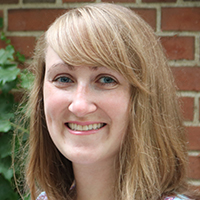LAS researchers receive funding for cutting-edge research
Author: lskramer
Author: lskramer
Faculty in the College of Liberal Arts and Sciences (LAS) have recently been awarded grants to work on questions that range from the synthesis of novel materials to predictions of wind formation in storms. This research is on the leading edge of scientific inquiry, and offers benefits of clean drinking water, public safety, and improvements in renewable energy production, among others.


William Gallus, professor and Christina Patricola, associate professor from the Department of the Earth, Atmosphere, and Climate, were awarded a $652,433 grant from the National Science Foundation (NSF) to look at how major wind events are formed in organized squall lines. With the large number of severe storms this summer, this work is especially timely.
They will examine two phenomena that can occur in lines of thunderstorms. Bow echoes, which are small segments embedded in a larger line of storms that contain higher winds, seem to ‘bow’ out ahead of the rest of the line. The other is derechos, which are very long-lived lines which produce significant winds across a large area.
Gallus and Patricola will work with student researchers, using numerical models to investigate the various processes involved in the formation of bow echoes and derechos. This work will improve forecasting, which will benefit public safety and reduce economic impacts.

Kirill Kovnir, professor in the Department of Chemistry, received a $598,033 NSF grant to discover novel methods of synthesizing chalcogenides. Chalcogenides are chemical compounds that are widely used in various applications that include renewable energy harvesting, energy conversion and storage, and information and data storage. Development of new chalcogenides with improved magnetic and thermoelectric properties is essential for advances in fields such as renewable energy and permanent magnets.
Kovnir is experimenting with new techniques for synthesizing these materials using solvents under heat and pressure. Current solvothermal methods to synthesize chalcogenides work in the range of 150-240°C (302-464°F). Professor Kovnir is developing methods to extend this range to lower temperatures, 20-150°C (68-302°F), as well as to higher temperatures, 240-400°C (464-752°F).

Pavan Aduri, interim chair in the Department of Computer Science, is working with a $262,300 NSF grant to develop innovative algorithms that will counteract the negative effects of randomness and reduce the element of uncertainty in regard to experimental results.
This research has many applications for machine learning and large data analysis. Many computing applications make inherent use of randomness, and the randomness is used to either speed up big data computations or aid in machine learning tasks. However, a drawback of randomized computations is that two different runs of the algorithm may produce two different results, preventing replication of the computation. This violates the fundamental requirement that scientific results must be replicable and reproducible.
Aduri’s research aims to explore new methods for achieving replicability in randomized computations. They will clarify what replicability entails for various types of computations, create strategies for designing randomized algorithms that are easily reproducible, and examine the limitations and costs involved in ensuring replicability.
This work will contribute to the development of algorithms and models that are replicable, ultimately leading to more reliable computations to support research and technological advancement.

Accessibility to adequate supplies of potable water remains an issue in regions with limited basic water infrastructure. Through a $649,989 NSF grant, Robbyn Anand, Suresh Faculty Fellow and Carlyle G. Caldwell Endowed Chair in Chemistry and associate professor in the Department of Chemistry, is working to alleviate that need.
She is working to develop a portable water purification and monitoring system that uses electric fields to remove contaminants. The first phase of her project involves bringing together stakeholders in affected areas to determine their needs and preferences. Then feasibility will be determined, and new sensing technology will be adapted to continuously monitor the water for possible contaminants.
This fit-for-purpose system will help to alleviate water insecurity and improve the quality of life for people who live in the affected areas.

Danica Ommen, associate professor in the Department of Statistics, is part of a team working on a $612,286 grant from the Department of Justice to develop guiding principals for applying score-based methods in a weight of evidence approach.
Score-based forensic analysis is used to compare two samples, such as fingerprints, to determine how similar they are to one another. A weight of evidence approach takes into account all of the bits of information and evidence to determine if it supports a particular conclusion.
Ommen and her colleagues will be working to develop statistical models to integrate score-based results into weight of evidence methods for the analysis of improvised explosive devices. This work will benefit law enforcement agencies in the U.S. and worldwide.